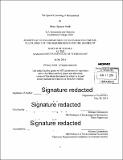| dc.contributor.advisor | Michael Greenstone. | en_US |
| dc.contributor.author | Swift, Henry Spencer | en_US |
| dc.contributor.other | Massachusetts Institute of Technology. Department of Economics. | en_US |
| dc.date.accessioned | 2014-09-19T21:41:45Z | |
| dc.date.available | 2014-09-19T21:41:45Z | |
| dc.date.issued | 2014 | en_US |
| dc.identifier.uri | http://hdl.handle.net/1721.1/90134 | |
| dc.description | Thesis: S.M., Massachusetts Institute of Technology, Department of Economics, 2014. | en_US |
| dc.description | "June 2014." Cataloged from PDF version of thesis. | en_US |
| dc.description | Includes bibliographical references (pages 42-44). | en_US |
| dc.description.abstract | Workers in similar occupations cluster, much like firms in similar industries. This may be due to firm clustering, but I propose a supply-side mechanism that may also provide an explanation. When workers face a risk of separation from a particular job, they will consider the other jobs available in a particular area in their location decision. Based on this theory I make three predictions. Workers will tend to cluster in areas where their skills are in high demand. They will be paid less in these areas, ceteris paribus. And demand shocks will affect workers' wages less, and employment more, in areas where their skills are in high demand. I test this mechanism using data from the decennial U.S. Census. I use O*NET data on occupational tasks to construct a measure of occupational distance. I then estimate labor supply curves to determine to test the predictions of the theory. I do not find substantial evidence for this mechanism. | en_US |
| dc.description.statementofresponsibility | by Henry Spencer Swift. | en_US |
| dc.format.extent | 49 pages | en_US |
| dc.language.iso | eng | en_US |
| dc.publisher | Massachusetts Institute of Technology | en_US |
| dc.rights | M.I.T. theses are protected by copyright. They may be viewed from this source for any purpose, but reproduction or distribution in any format is prohibited without written permission. See provided URL for inquiries about permission. | en_US |
| dc.rights.uri | http://dspace.mit.edu/handle/1721.1/7582 | en_US |
| dc.subject | Economics. | en_US |
| dc.title | The spatial clustering of occupations | en_US |
| dc.type | Thesis | en_US |
| dc.description.degree | S.M. | en_US |
| dc.contributor.department | Massachusetts Institute of Technology. Department of Economics | |
| dc.identifier.oclc | 890150673 | en_US |
